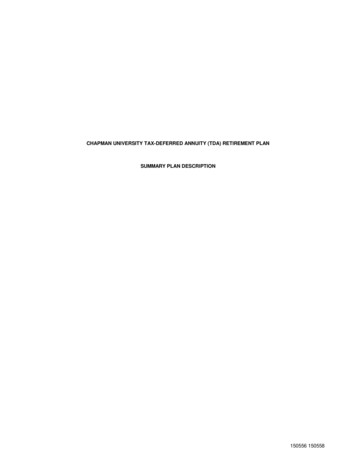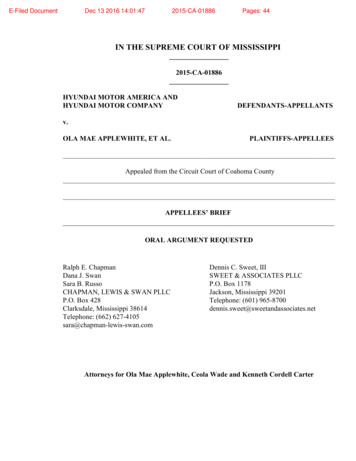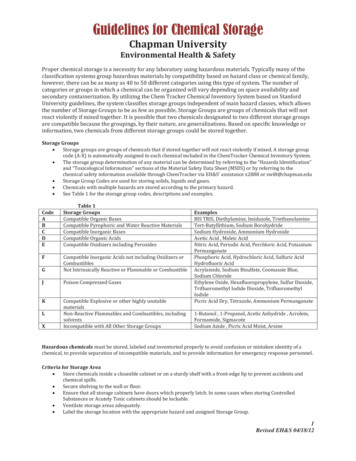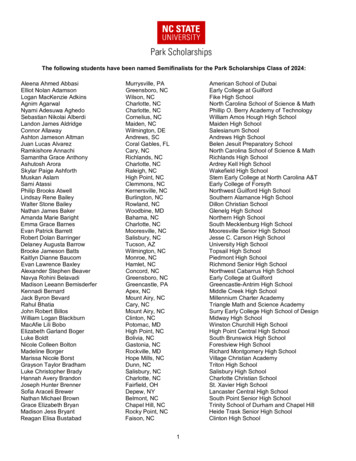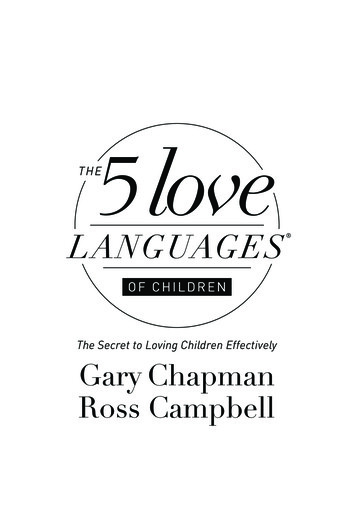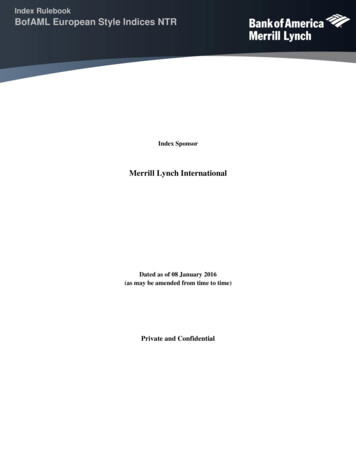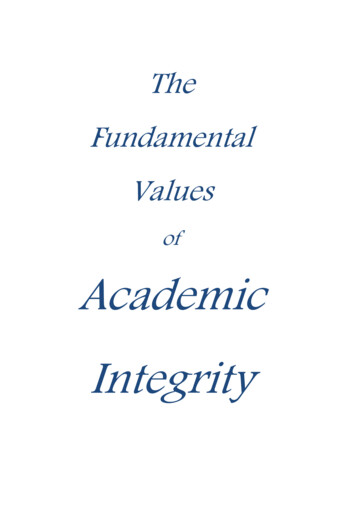
Transcription
TheFundamentalValuesofAcademicIntegrity
The original (first edition of) The Fundamental Values project wasgenerously supported by the William and Flora Hewlett Foundationand recognized Sally Cole, Larry Hinman, Elizabeth Kiss, and JeanneWilson for their editorial leadership. The first edition was introducedby Nannerl O. Keohane, President of Duke University, 1999. Theoriginal publication was designed and produced for the Center forAcademic Integrity (now ICAI) by the Office of College Relations atOakton Community College, Des Plaines, Illinois.The Second Edition of the The Fundamental Values is licensed by theInternational Center for Academic Integrity under CreativeCommons: Attribution-NonCommercial-ShareAlike 4.0 International(CC BY-NC-SA 4.0)ISBN: 978-0-9914906-7-7 (pbk)
The Fundamental ValuesofAcademic IntegritySecond EditionInternational Center forAcademic IntegrityT. Fishman, Editor
The quality of light by which wescrutinize our lives has directbearing upon the product which welive, and upon the changes whichwe hope to bring about throughthose lives. Audre Lorde“Your beliefs become your thoughts,Your thoughts become your words,Your words become your actions,Your actions become your habits,Your habits become your values,Your values become your destiny.” Mahatma GandhiI prefer to be true to myself, even at the hazard of incurring theridicule of others, rather than to be false, and to incur my ownabhorrence. Frederick DouglassNot to arrive at a clear understanding of one's own values is a tragicwaste. You have missed the whole point of what life is for.” Eleanor RooseveltWhat is left when honor is lost? Publilius SyrusFaced with what is right, to leave it undone shows a lack of courage. Confucius“Courage is the most important of all the virtues because withoutcourage, you can't practice any other virtue consistently.” Maya AngelouIf a teacher does not involve himself, his values,his commitments, in the course of discussion,why should the students? Paul Wellstone
Contents:Preface to the Second EditionPreface to the Original: An InvitationOriginal SignatoriesAdditional SignatoriesWhat is Academic Integrity?The Fundamental urageDeveloping Cultures of IntegrityAcknowledgementsThe Fundamental Values Project
In recognition of the 20th anniversary of the founding of theInternational Center for Academic Integrity, members of theadvisory council set out to “revise and re-vitalize” the FundamentalValues in hopes not only of extending its usefulness, but also ofdrawing attention, once again, to the crucial role that integrity andits component values play in education. The popularity of theoriginal Fundamental Values has made it one of the Center’s mostfrequently requested texts. It has been quoted, sampled, translatedand reprinted at universities throughout North America andaround the globe. It is our hope that this revision will live up to thehigh expectations set by the original.The revised edition features the original five values: honesty,trust, fairness, respect and responsibility, and adds an additionalelement: the quality of courage. Through our work with academicintegrity, we have found that courage turns out to be indispensablein enacting the fundamental values, especially in the face ofpressure to do otherwise.Since the original Fundamental Values text was published in1999, many changes have taken place at the Center. It now makesits institutional home at Clemson University, in affiliation with the
Rutland Institute for Ethics. It has grown to over 1,200 membersat 250 institutions in 19 countries on 6 continents. The Centerhas also formally recognized the trend towardinternationalization—of issues, of discussions, and most happily,of its membership—by formally becoming the InternationalCenter for Academic Integrity (ICAI).What has not changed is the Center’s commitment topromoting the fundamental values and academic integrity inscholarly communities of all kinds. As new challenges tointegrity appear, so too do new strategies and techniques forteaching and encouraging ethical decision making. Efforts tocreate and maintain cultures of integrity require our continuousongoing attention. For that reason, we affirm our commitment tofostering and upholding the fundamental values and encouragingpersonal, institutional, and cultural commitment to highstandards of academic integrity with this, the revised andrevitalized Fundamental Values.T. A. FishmanDirector, ICAI
An Invitation*As this document on The Fundamental Values ofAcademic Integrity makes clear, academic integrity isessential to the success of our mission as educator. It alsoprovides a foundation for responsible conduct in ourstudents’ lives after graduation. The Center for AcademicIntegrity, a consortium of 200 colleges and universities,seeks to encourage campus conversations about this vitaltopic. Since 1997, the Center has made its home at Dukein affiliation with our Kenan Ethics Program. Itspresence has been a wonderful asset to the efforts ofDuke students, faculty, and administrators in promotingacademic integrity on our campus. I am especiallypleased, therefore, to have the opportunity to share theCenter’s work with colleagues in higher education acrossthe country.It can be difficult to translate values, even widely-sharedvalues, into action—but action is badly needed now topromote academic integrity on our campuses.Researchers agree that rates of cheating amongAmerican high school and college students are high andincreasing. Professor Donald McCabe of RutgersUniversity, founder of the Center for Academic Integrity,has found that more than 75% of college students cheatat least once during their undergraduate careers.Particularly alarming is research gathered by Who’s WhoAmong High School Students indicating that 80 percent
of high-achieving, college-bound students have cheated,that they think cheating is commonplace, and that morethan half do not consider cheating a serioustransgression. New technologies have also made it easierto cheat: The Educational Testing Service notes that onewebsite providing free term papers to students hasaveraged 80,000 hits per day.Not all the news is depressing. The Center for AcademicIntegrity’s research shows that campus norms andpractices, such as effective honor codes, can make asignificant difference in student behaviors, attitudes, andbeliefs. The organizations listed here join me in urgingour colleagues in higher education to read and discussthis document and to pursue its recommendations forinstitutional action. All of us—faculty, administrators,students, trustees, and concerned alumni—have aresponsibility to get involved. Raising the level ofstudent academic integrity should be among our highestpriorities on college and university campuses.Nannerl O. KeohanePresident, Duke University1999*This invitation is from the original 1999 edition of TheFundamental Values of Academic Integrity
The following organizations expressedtheir support for the first edition of TheFundamental Values: Alliance for Higher EducationAmerican Association for Higher EducationAmerican Association of UniversityAdministratorsAssociation for Student Judicial AffairsAssociation of Catholic Colleges and UniversitiesAssociation of College Honor SocietiesAssociation of College Personnel AdministratorsCenter for applied and Professional Ethics,Central Missouri State UniversityCenter for Ethics in Public Policy and theProfessions, Emory UniversityCenter for Professional Ethics, ManhattanCollegeCollege BoardEducational Testing ServiceInstitute for Global EthicsJohn Templeton Foundation
Kenan Ethics Program, Duke UniversityKings College Center for Ethics and Public LifeNational Association of State Universities andLand-Grant CollegesNational Association of Student PersonnelAdministratorsNational Collegiate Athletic AssociationNational Consortium for Academics and SportsNational Institute for Native Leadership inHigher EducationNational Intramural-Recreational SportsAssociationNorth Central Association of Colleges andSchools, Commission on Institutions of HigherEducationProgram on Ethics and Public Life, CornellUniversityWilliam and Flora Hewlett FoundationThe Values Institute, University of San Diego
These additional individuals andorganizations expressed their supportfor The Fundamental Values, 2nd edition: Adelphi UniversityAlbany College of Pharmacy and Health SciencesAmerican University in DubaiAzusa Pacific UniversityBentley UniversityBrock UniversityCarroll CollegeCentennial CollegeChristopher Newport UniversityColorado State UniversityFlorida International UniversityFlorida State UniversityGeorgia Military CollegeHofstra UniversityJohn Jay College of Law – CUNYKennesaw State UniversityMississippi State UniversityMissouri State UniversityMount Royal UniversityMykolas Romeris UniversityPalmer College of ChiropracticSaint Leo UniversitySimon Fraser UniversityStevens Institute of TechnologySUNY Stony BrookSyracuse University
The American College of Greece – DereeThe Apprentice SchoolThe School for Ethical EducationThe University of RochesterTracey Bretag, University of South AustraliaTricia Bertram Gallant, UC San DiegoUniversidad EAFITUniversity of AlabamaUniversity of AlbertaUniversity of Colorado at BoulderUniversity of DenverUniversity of GeorgiaUniversity of ManitobaUniversity of Mary WashingtonUniversity of Maryland, Baltimore CountyUniversity of MichiganUniversity of Minnesota, Twin CitiesUniversity of MonterreyUniversity of New BrunswickUniversity of North Carolina, CharlotteUniversity of OklahomaUniversity of South CarolinaUniversity of South FloridaUniversity of TorontoUniversity of WaterlooUniversity of Wisconsin, MadisonUniversity of Wisconsin, StoutVirginia TechWindward SchoolWinona State University
What is Academic Integrity?Why Is It Important?Why identify fundamental values?Many teachers, students, and administrators embrace theprinciples of academic integrity because they know thatthe goals of teaching, learning, and research can only beaccomplished in environments in which ethical standardsare upheld. It is still rare, however, for scholarlyinstitutions to identify and describe their commitment tothe principles of integrity in terms that are at oncepositive and practical. Instead, it is more common to findthe subject of academic integrity addressed byidentifying and prohibiting behaviors that run counter tothe principles of integrity. The Fundamental ValuesProject is an attempt to frame academic integrity in waysthat are both positive and pragmatic.The International Center for Academic Integrity definesacademic integrity as a commitment to five fundamentalvalues: honesty, trust, fairness, respect, andresponsibility. We believe that these five values, plus thecourage to act on them even in the face of adversity, aretruly foundational to the academy. Without them,everything that we do in our capacities as teachers,learners, and researchers loses value and becomessuspect. When the fundamental values are embraced,
utilized, and put into practice they become touchstonesfor scholarly communities of integrity. Rather thanthinking of them merely as abstract principles, weadvocate using the fundamental values to inform andimprove ethical decision-making capacities and behavior.The fundamental values enable academic communities totranslate their ideals into action.Academic integrity is a way tochange the world. Change theuniversity first; then change theworld. Youngsup KimICAI Conference Participant2008Scholarly communities flourish when communitymembers “live” the fundamental values. To do this,community members must invoke them—making thempart of frequent dialogues that invite students, faculty,and administrators to consider the potential for ethicalvalues to inform and improve various aspects of life oncampus and beyond. Integrity is strengthened withinacademic communities when community standards are analigned with the fundamental values and supported by itsinstitutional policies and procedures. When a society’seducational institutions are infused with integrity, theyhelp create stronger civic culture for society as a whole.
HonestyAcademic communities of integrity advance the quest fortruth and knowledge through intellectual and personalhonesty in learning, teaching, research, and service.Honesty is an indispensable foundation of teaching, learning,research, and service, and a necessary prerequisite for fullrealization of trust, fairness, respect, and responsibility. It isessential that academic policies and community practices send aclear message that falsification of data, lying, cheating fraud,theft, and other dishonest behaviors are unacceptable.Honesty is the first chapter in thebook of wisdom. Thomas JeffersonDishonest behavior not only jeopardizes the welfare of academiccommunities and violates the rights of its members, it can alsotarnish the reputation of the institution and diminish the worthof the degrees it grants. Honesty begins with individuals andextends out into the larger community. As they seek knowledge,students and faculty alike must be honest with themselves andwith each other. In study halls and laboratories, in libraries,playing fields and classrooms, cultivating and practicing honesty
lays a foundation for lifelong integrity. Developing thecourage and wherewithal necessary to make honest,ethical choices, even when at personal cost, is a necessarystep in establishing communities of trust.“The ability of the university to achieve its purposes depends upon thequality and integrity of the academic work that its faculty, staff, andstudents perform. Academic freedom can flourish only in a community ofscholars which recognizes that intellectual integrity, with itsaccompanying rights and the responsibilities, lies at the heart of itsmission. Observing basic honesty in one’s work, words, ideas, andactions is a principle to which all members of the community arerequired to subscribe. “Rights, Rules, Responsibilities”Princeton University1995
TrustAcademic communities of integrity both foster and relyupon climates of mutual trust. Climates of trustencourage and support the free exchange of ideas whichin turn allows scholarly inquiry to reach its fullestpotential.When honesty is established as a value it allows for andencourages the development of trust. Trust accrues over time,with experience, and is built on a foundation of actions moreimportantly than words.I have to trust what I do and thendo it. Ednita NazarioTrust is promoted by faculty who set clear guidelines forassignments and for evaluating student work and by studentswho prepare work that is honest, thoughtful, and genuine.Trust is developed by schools that set clear and consistentacademic standards, that apply their standards unfailingly andfairly, and that support honest and impartial research. Trust isoften developed reciprocally; being trustworthy and allowingoneself to trust others go hand in hand.Trust is a necessary foundation of academic work. Only withtrust can we ground new inquiries in the research of others andmove forward with confidence.
move forward with confidence. Trust enables us tocollaborate, to share information, and to circulate newideas freely, without fear that our work will be stolen,our careers stunted, or our reputations diminished.Trust is essential so that those outside academiccommunities can believe in the value and meaning ofscholarly research, teaching, and degrees. Communitiesof trust engender cooperation by creating environmentsin which participants expect to treat others –and betreated– with fairness and respect.“This semester a professor excused me from taking a test at the normaltime and allowed me to choose the time and date when I could make itup. Mutual trust was built from day one of this semester and hasinfluenced the way I approach the course. I feel an obligation to myteacher to perform to the best of my ability, which I credit to the respectwe have for one another in our different roles.” Student Representative of ICAI
FairnessAcademic communities of integrity establish clear andtransparent expectations, standards, and practices tosupport fairness in the interactions of students, faculty,and administrators.Fair treatment is an essential factor in the establishment ofethical communities. Important components of fairness includepredictability, transparency, and clear, reasonable expectations.Consistent and just responses to dishonesty and integritybreaches are also elements of fairness. Fair, accurate andimpartial evaluation plays an important role in educationalprocesses, and fairness with respect to grading and assessmentis essential to the establishment of trust between faculty andstudents.Justice cannot be for one side alone,but must be for both. Eleanor RooseveltFaculty members and administration also have a right to expectfair treatment, not only from students but also from each other.Students are fair to each other and to the community when theydo their own work honestly, to authors when they acknowledgeborrowed work appropriately, to administrators when theyrespect and uphold academic integrity policies, and to alumniwhen they maintain the good reputation of the institution.
Faculty members are fair to students and institutionswhen they communicate expectations clearly, respond todishonesty consistently, uphold academic integrityprinciples unfailingly, and lead by example dependably.Administrators are fair to their communities when theyprovide clear, useful, and just policies that help establishand nurture communities of integrity, and that treatstudents, faculty, alumni, and institutions with respect.“Students expect their academic work to be fairly and fully assessed.Faculty members should use—and continuously revise—forms ofassessment that require active and creative thought and promotelearning opportunities for students.” ”Message for New Students: The Importance of Academic Integrity”SYNFAX Weekly Report 9/1/97
RespectAcademic communities of integrity value the interactive,cooperative, participatory nature of learning. Theyhonor, value, and consider diverse opinions and ideas.Scholarly communities succeed only where there is respect forcommunity members and for the diverse and sometimescontradictory opinions that they express. The most dynamicand productive learning environments are those that fosteractive engagement, including rigorous testing, spirited debate,and lively disagreements over ideas tempered by respect forthose who voice them. In academic environments of integrity,even those who disagree on facts share respect and reverence forknowledge and the methods by which it is obtained.Without feelings of respect, what isthere to distinguish men frombeasts? ConfuciusRespect in academic communities is reciprocal and requiresshowing respect for oneself as well as others. Respect for selfmeans facing challenges with integrity. Respect for othersmeans valuing diversity of opinions and appreciating the need tochallenge, test, and refine ideas.
Students show respect when they value and takeadvantage of opportunities to gain new knowledge, bytaking an active role in their own education, contributingto discussions as well as listening to others’ points ofview, and performing to the best of their ability. Beingrude, demeaning, or disruptive to others underminesclimates of respect.Faculty show respect by taking their students’ ideasseriously, by recognizing them as individuals, helpingthem develop their ideas, providing full and honestfeedback on their work, and valuing their perspectivesand their goals. Members of academic communities alsoshow respect for other scholars by acknowledgingintellectual contributions through proper identificationand citation of sources. Cultivating environments inwhich all members show and enjoy respect is both anindividual and a collective responsibility.“As a scholar, one should be generous in acknowledging the work ofother scholars, for their work makes possible one’s own.” “Academic Honesty in the Writing of Essays and Other Papers”Carleton College, 1990 Princeton University
ResponsibilityAcademic communities of integrity rest uponfoundations of personal accountability coupled with thewillingness of individuals and groups to lead byexample, uphold mutually agreed-upon standards, andtake action when they encounter wrongdoing.Responsibility for upholding the values of integrity issimultaneously an individual duty and a shared concern. Everymember of an academic community – each student, facultymember, and administrator – is responsible for safeguarding theintegrity of its scholarship, teaching and research."Someone ought to do it, but why should I?" –"Someone ought to do it, so why not I?"Between these two sentences lie wholecenturies of moral evolution. Annie BesantShared responsibility both distributes and magnifies the powerto effect change. Responsible communities can work toovercome apathy and to inspire others to uphold the academicintegrity standards of the group. Being responsible meansstanding up against wrongdoing, resisting negative peerpressure, and serving as a positive example. Responsibleindividuals hold themselves accountable for their own actions,and work to discourage and prevent misconduct by others.
Cultivating responsibility means learning to recognizeand resist the impulse to engage in unscrupulousbehavior. Being a responsible member of an academiccommunity also means holding others accountable whenthey fail to uphold the values of the group. Holdingoneself and others to high standards of integrity is oftenchallenging; it requires courage.“When we take responsibility for the work we produce, we give itcredibility. Without credibility, there is no point in doing the work." Deb Eerkes, ICAI Leader
CourageTo develop and sustaining communities of integrity, ittakes more than simply believing in the fundamentalvalues. Translating the values from talking points intoaction--standing up for them in the face of pressure andadversity—requires determination, commitment, andcourage.Courage differs from the preceding fundamental values in that itis less a value than a quality or capacity. Courageous people areoften misunderstood as lacking fear. In reality, courage is thecapacity to act in accordance with one’s values despite fear.“Courage is the first of humanqualities because it is the qualitywhich guarantees the others.” AristotleCourage is an element of character that allows learners tocommit to the quality of their education by holding themselvesand their fellow learners to the highest standards of academicintegrity even when doing so involves risk of negativeconsequences or reprisal.Being courageous means acting in accordance with one’sconvictions. Like intellectual capacity, courage can only developin environments where it is tested.
Academic communities of integrity, therefore, necessarilyinclude opportunities to make choices, learn from them,and grow. Through this iterative process, courage,honor, and integrity can develop as interwoven andmutually dependent characteristics.Members of academic communities must learn not onlyto make integrous decisions, but also to display thecourage necessary to follow their decisions with action.Only through the exercise of courage is it possible tocreate and maintain communities of integrity strongenough to endure as responsible, respectful, trustworthy,fair and honest regardless of the circumstances they face.Faculty and students who display courage in the pursuit of integrity notonly become role models but also increase standards for learning andscholarship. Community is thus forged and becomes a key source forbuilding habits of civility for a lifetime. Pat Drinan, Founding Member, ICAI
Developing Effective AcademicIntegrity ProgramsPromoting the fundamental values of academic integrityin education requires balancing high standards ofintegrity with the educational mission, as well ascompassion, and concern. Two decades of attention tothe processes and practices of successful academicintegrity programs inform the followingrecommendations for programmatic development.While there is no “one-size-fits-all” formula forestablishing climates of integrity, there are steps that canbe taken to maximize chances for success.Institutions should:1.Develop and publicize clear, fair, academicintegrity policies, procedures, and statements that can beeffectively understood and consistently implemented.2.Promote positive aspects of academic integrityamongst all segments of the campus community.Promotional activities should include discussions of thefundamental values, development of ethical decisionmaking capacities, and highlighting the link betweenacademic integrity and broader ethical concerns.
3.Educate all members of the community aboutacademic integrity standards so that expectations arewell understood as integral components of thecommunity culture.4.Practice the actions described in campus policiesconsistently and fairly. Provide support to those whofollow the policies and uphold standards.5.Develop, explain, and administer equitable,transparent systems for adjudicating integrity violations.6.Stay abreast of current developments intechnology and educational practices in order toanticipate increased risks and address potential problems.7.Regularly assess the effectiveness of academicintegrity policies, procedures, and practices. Revise andrevitalize as necessary to update and improve.The details of each institution’s academic integrityprograms must depend on the specific characteristics ofthe community. In each case, however, the relationshipbetween policies and procedures, community standards,and day-to-day conduct should be congruent, consistent,and compatible with the agreed-upon institutionalvalues.
Acknowledgments*When board members of the Center for AcademicIntegrity assembled at Duke University in September1997 to identify the fundamental values of academicintegrity, we could hear the echoes of generations ofscholars and teachers who have promoted honorablebehavior on campuses. Generous financial support andencouragement from the William and Flora HewlettFoundation enabled us to focus on a statement wouldmake our collective wisdom available to other schools.This statement was discussed and refined at conferencesheld at the University of San Diego and at BabsonCollege. The result was this document, TheFundamental Values of Academic Integrity.Many people collaborated on the statement, but weespecially thank Sally Cole of the Center for AcademicIntegrity, Larry Hinman of the University of San Diego,Elisabeth Kiss of Duke University, and Jeanne Wilson ofthe University of California at Davis for their intellectualand editorial leadership. At critical times, each of theseindividuals helped us move forward.Heartfelt thanks go also to the hundreds of students,faculty, and administrators who have made helpful andcritical comments, offered examples and quotes fromtheir own campuses, and reinforced our conviction thatthe fundamental values of honesty, trust, respect,fairness,*These acknowledgements are from the original document,excepting the additional acknowledgements and wherenoted.
and responsibility offer an important conceptualstructure within which to look carefully at one’s ownapproach to academic integrity issues on a campus.Finally, thank you to the hundreds of individualmembers of the [now International] Center forAcademic Integrity. Without their energy and enduringinvolvement, this project could not have been attempted.Additional Acknowledgements: The 2012 revision ofThe Fundamental Values was undertaken by acommittee comprised of:Tricia Bertram Gallant,Deborah Eerkes,Tony Feghali,Teddi Fishman,Joseph Gordon,Alax Jones,Pamela Law,James M. Lancaster,Donald L. McCabe,Vincent McGuire,Aaron A. Monson,Mary Olson,and Philip ZachariahAs was the case for the original Fundamental Valuesproject, this edition would not have been possible were itnot for the dedication of these individuals as well as thesupport and involvement of the hundreds of members ofICAI whose commitment to the principles of integrityunderpin all of the achievements of the organization.
The Project on TheFundamental Values ofAcademic IntegrityThe Fundamental Values Project was undertaken toidentify and define values upon which scholarlyendeavors and the educational enterprise rely. Byrecognizing these fundamental values that apply acrosscultures and institutional types, the hope was to helpinform and improve policies, practices, and ultimatelyacademic communities themselves.This project received generous support from the Williamand Flora Hewlett Foundation and from the KenanEthics Program.The International Center for Academic Integrity is aconsortium of schools, colleges, and universities acrossthe globe, united to combat cheating and promoteintegrity in all aspects of education. The Centerwelcomes participation and involvement from all whoshare in that aim. For more information about theCenter, please visit our web page:www.AcademicIntegrity.orgThe International Center for Academic Integrity isaffiliated with the Rutland Institute for Ethics atClemson University in South Carolina.
Licensed by the International Center for Academic Integrityunder Creative Commons: Attribution-NonCommercialShareAlike 4.0 International (CC BY-NC-SA 4.0)You are free to: Share — copy and redistribute the material in any mediumor format Adapt — remix, transform, and build upon the material The licensor cannot revoke these freedoms as long as youfollow the license terms.Under the following terms: Attribution — You must give appropriate credit, provide alink to the license, and indicate if changes were made. Youmay
trust, fairness, respect and responsibility, and adds an additional element: the quality of courage. Through our work with academic integrity, we have found that courage turns out to be indispensable in enacting the fundamental values, especially in the face of pressure to do otherwise. Si

